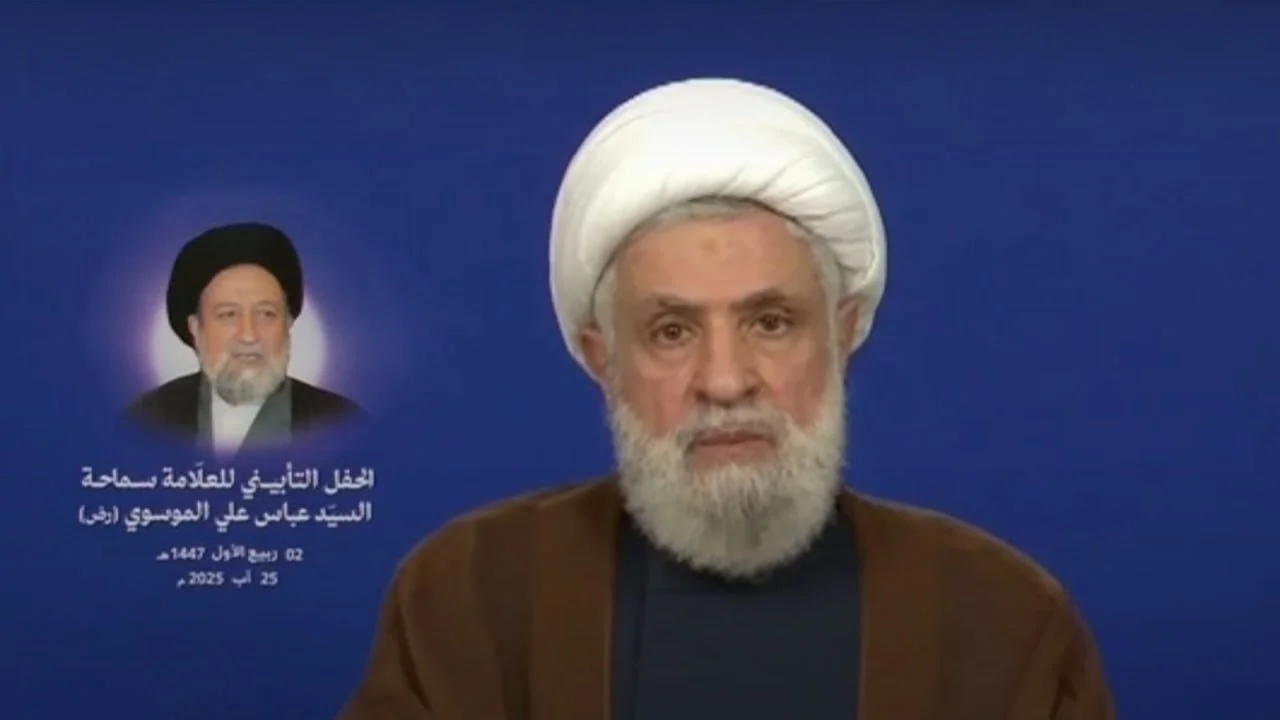Hezbollah’s Naeem Qassem Defies Disarmament Push, Blames U.S. and Israel for Lebanon’s Crisis
Executive Summary
In a fiery speech commemorating Sayyid Abbas Ali Al-Mussawi, Hezbollah’s Secretary-General Sheikh Naeem Qassem condemned Israel’s bombing of Yemen, rejected calls to disarm Hezbollah, and accused the Lebanese government of capitulating to U.S. and Israeli pressure. Qassem reasserted the role of Hezbollah as Lebanon’s protector and warned of escalation if disarmament proceeds, reaffirming the group’s commitment to armed resistance until Israeli withdrawal and reconstruction are achieved.
Key Judgments
Key Judgment 1
Qassem’s rejection of disarmament reflects Hezbollah’s firm position that its weapons are non-negotiable and tied to Lebanon’s sovereignty and survival.
Evidence: Qassem labeled the government’s demilitarization policy as “sinful,” imposed by Israeli dictates, and said Hezbollah’s weapons represent “our soul, dignity, and land.” He asserted the resistance would not surrender its arms while Israeli aggression and occupation persist.
Key Judgment 2
The speech reinforces Hezbollah’s narrative that American influence is the root of Lebanon’s economic and political crisis.
Evidence: Qassem accused the U.S. of sabotaging Lebanon through sanctions, obstructing reconstruction, and blocking access to defensive arms. He linked these actions to broader efforts to destabilize Lebanon and impose Western control.
Key Judgment 3
By invoking the regional context—including Yemen and Gaza—Qassem is framing Hezbollah’s mission as part of a broader “Axis of Resistance” while mobilizing pan-Islamic support against perceived Western betrayal.
Evidence: Qassem praised Yemen’s steadfastness in supporting Gaza, criticized Arab and Muslim states for failing to act, and framed the resistance as a unifying force against Israeli expansionism across the region.
Analysis
Hezbollah Secretary-General Sheikh Naeem Qassem’s August 25 speech is a direct challenge to both the Lebanese state and its Western backers. Delivered at a symbolic celebration for the late Sayyid Abbas Ali Al-Mussawi, the speech fused Hezbollah’s core ideological tenets—armed resistance, anti-imperialism, and regional solidarity—into a combative rejection of the state’s latest attempt to impose disarmament.
Qassem’s rhetoric shows Hezbollah perceives the government’s disarmament proposal not merely as a policy disagreement, but as an existential threat. By calling the government’s move “sinful” and asserting it was dictated by Israel, he cast the state as complicit in a foreign plot to undermine Lebanon’s security and sovereignty. His invocation of Hezbollah’s past sacrifices—10,000 dead fighters, deterrence since 2006—aimed to reframe disarmament as betrayal rather than reform.
He also sought to internationalize Hezbollah’s position. Linking Israel’s bombing of Yemen with its broader military strategy, Qassem positioned Hezbollah as part of a vanguard standing against global silence and complicity in the face of Israeli aggression. By praising Yemen’s Houthis and criticizing the absence of pan-Arab support for Gaza, he is both mobilizing regional outrage and legitimizing Hezbollah’s continued military posture.
More strategically, the speech attempts to paint American influence as the true source of Lebanon’s suffering. From sanctions and arms embargoes to blocking reconstruction aid, Qassem argued the U.S. is actively preventing Lebanon’s recovery to maintain control. This narrative reinforces Hezbollah’s justification for armed autonomy—claiming that the Lebanese state is too weak, or too compromised, to protect its people without the resistance.
The underlying message is clear: any attempt to disarm Hezbollah without a complete Israeli withdrawal, prisoner release, and reconstruction effort will be viewed as illegitimate. Qassem’s final demand—that only after Israel complies with all resistance conditions will Hezbollah “discuss” a national defense strategy—signals not only intransigence but the intention to dictate terms on its own timeline.


